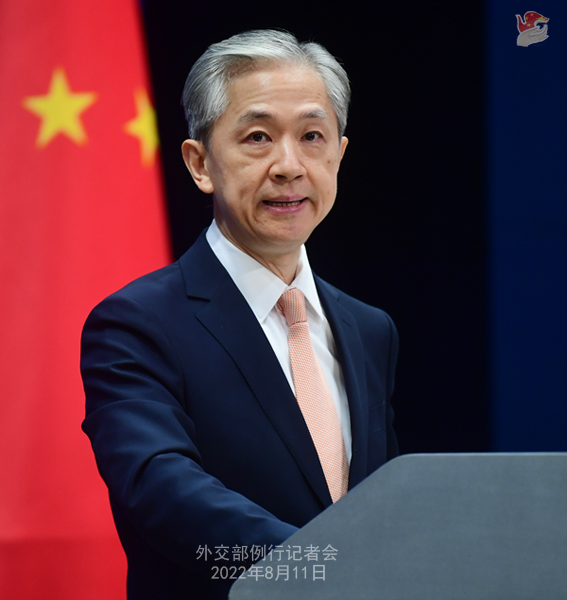
Phoenix TV: Agnė Vaiciukevičiūtė, Deputy Minister of Transport and Communications of Lithuania, led a delegation to Taiwan on August 7 for a five-day visit. Do you have any comment?
Wang Wenbin: We strongly condemn the act of Lithuania’s anti-China forces to deliberately infringe on China’s sovereignty and grossly interfere in China’s domestic affairs. The one-China principle is a basic norm in international relations and the political foundation on which China develops bilateral relations with all other countries including Lithuania. The Joint Communiqué on the Establishment of Diplomatic Relations between the People’s Republic of China and the Republic of Lithuania clearly stipulates that the Government of the Republic of Lithuania recognizes the Government of the People’s Republic of China as the sole legal government of China and Taiwan as an inalienable part of the Chinese territory. The Government of the Republic of Lithuania undertakes the obligation not to establish official relations or engage in official contacts with Taiwan. However, Lithuania has time and again reneged on its commitment and apparently been acting in bad faith.
China will act resolutely in response to the egregious provocation of certain individuals in Lithuania to challenge the one-China principle and undermine China’s sovereignty and territorial integrity. We urge certain people in Lithuania to stop being the pawn of the “Taiwan independence” and anti-China forces and stop moving even further down the wrong path.
Shenzhen TV: The Mombasa-Nairobi Railway celebrates its fifth anniversary of operation this year. In recent years, many Chinese railway cooperation projects have gone global and become a “golden key” to boosting local economic and social development. Could you share more information with us?
Wang Wenbin: In recent years, Chinese railway has been going global at a faster speed. Projects involving Chinese railway are seen in Asia, Europe, North America and Africa. It has become a name brand for Belt and Road cooperation and international industrial capacity cooperation. This is part of China’s contribution to global development.
The Mombasa-Nairobi Standard Gauge Railway (SGR) has become a booster to Kenya’s socio-economic development and the improvement of people’s livelihood. Since it started operation five years ago, the Mombasa-Nairobi SGR has been well received by local people, with its average occupancy rate being over 90 percent. According to preliminary estimate, it will contribute over 2 percent to Kenya’s GDP. The railway project has created nearly 50,000 jobs in Kenya, and for the vast majority of those jobs, over 80 percent of their employees are locals. The project has also trained more than 1,700 highly professional railway technicians and management personnel. According to reports, the UK Daily Telegraph has listed the Mombasa-Nairobi Railway as one of the 13 most remarkable rail tours. In CNN Travel’s list of the “20 best things to do in Kenya”, a ride on the Mombasa-Nairobi Railway comes fifth. As Kenyan President Uhuru Kenyatta said, the Mombasa-Nairobi Railway has created jobs, hope, opportunities and prosperity for all Kenyans.
The China-Laos Railway is another case in point. During its construction, the railway created more than 110,000 local jobs and the Chinese side helped build around 2,000 km of roads and canals along the railway and over 5.1 billion yuan worth of materials and supplies were purchased from Laos. Since its start of operation eight months ago, the China-Laos Railway’s cross-border freight transportation capacity has grown significantly, and the category of goods it transports has increased by more than 12 times. Services in tourism, logistics and infrastructure construction along the route have also been improved and upgraded.
From the Tazara Railway, the Mombasa-Nairobi Standard Gauge Railway and the China-Laos Railway to the Budapest-Belgrade Railway and the Jakarta-Bandung High-Speed Railway, these projects have not only brought these countries Chinese products, technologies and services and fresh development opportunities, but also carry the friendship between China and these countries. These inspiring stories of the success of Chinese railway in many parts of the world indicate that global development will only flourish if we all join together and foster a development paradigm featuring benefits for all, balance, coordination, inclusiveness, win-win cooperation and common prosperity. China will work with all parties to continue to promote high-quality Belt and Road cooperation and contribute to global common development and prosperity.
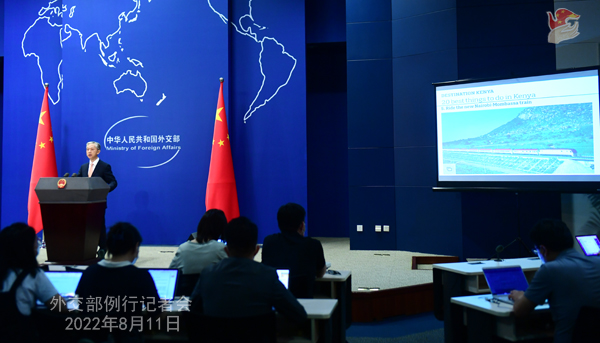
CCTV: The Taiwan Affairs Office of the State Council and the State Council Information Office published a white paper titled “The Taiwan Question and China’s Reunification in the New Era” yesterday morning. What is the Foreign Ministry’s comment on it?
Wang Wenbin: Yesterday morning, the Taiwan Affairs Office of the State Council and the State Council Information Office jointly published a white paper titled “The Taiwan Question and China’s Reunification in the New Era”. The white paper systematically outlined in detail the position and policies of the CPC and the Chinese government of realizing national reunification in the new era, and fully demonstrates the firm resolve of the CPC and the Chinese people and their commitment to national reunification. We believe the white paper will help people from various walks of life in and outside China to fully and accurately understand the Chinese government’s position on the Taiwan question. Here I would like to stress a few points.
First, Taiwan is part of China - this is an indisputable fact. There is only one China in the world and Taiwan has belonged to China since ancient times. In 1895, Japan forced the Qing government to cede Taiwan after Japan’s war of aggression against China. In 1943, the Cairo Declaration clearly stipulated that all the territories Japan had stolen from China, including Taiwan, should be restored to China. The Potsdam Proclamation of 1945 reiterated that “The terms of the Cairo Declaration shall be carried out.” On October 25, 1945, the Chinese government announced that it was resuming the exercise of sovereignty over Taiwan and China had recovered Taiwan de jure and de facto. In 1949, the People’s Republic of China (PRC) was founded, becoming the successor to the Republic of China, and the Central People’s Government became the sole legal government of the whole of China. The new government replaced the previous KMT regime in a situation where China, as a subject of international law, did not change and China’s sovereignty and territory did not change. The two sides of the Taiwan Strait have fallen into a state of protracted political confrontation. But the sovereignty and territory of China have never been divided and will never be divided, and Taiwan's status as part of China’s territory has never changed and will never be allowed to change. This effectively refutes the false argument that the status of Taiwan has yet to be determined, and makes a powerful case against various kinds of wrong perceptions of history and lies that seek to justify “Taiwan independence”.
Second, the CPC and the Chinese government have always been committed to realizing complete national reunification. Resolving the Taiwan question and realizing complete national reunification is the shared aspiration of all the Chinese people and a commitment and a historical mission of the CPC. Peaceful reunification and One Country, Two Systems are our fundamental guidelines for resolving the Taiwan question. National reunification by peaceful means is the first choice of the CPC and the Chinese government in resolving the Taiwan question, as it best serves the interests of the Chinese nation as a whole, including our compatriots in Taiwan. We are ready to create vast space for peaceful reunification; but we will leave no room for separatist activities in any form. We will work with the greatest sincerity and exert our utmost efforts to achieve peaceful reunification. If separatist elements or external forces make provocation or even cross our red lines, we will be forced to take resolute measures. This clearly answers the question in the international community about what China’s fundamental guidelines are on the Taiwan question, and shatters the wishful thinking of “Taiwan independence” forces and foreign interfering forces to split China.
Third, the one-China principle brooks no distortion or challenge. The connotation of the one-China principle is crystal-clear, i.e. there is only one China in the world and Taiwan is part of China. The Government of the PRC is the sole legal government representing the whole of China. The one-China principle is a prevailing international consensus and widely accepted basic norm in international relations. It is affirmed in UNGA Resolution 2758. It is the political foundation for interactions between China and all countries in the world. To date, 181 countries have established diplomatic relations with China on the basis of the one-China principle. This fully shows that standing up for the one-China principle is the right thing to do. It has the overwhelming support of the international community and represents the trend of the world. In response to US House Speaker Nancy Pelosi’s recent visit to the Taiwan region, more than 170 countries and many international organizations have reiterated their one-China commitment. The international community has once again spoken out for justice.
Fourth, China’s complete reunification is a process that cannot be halted. National reunification is an essential step towards national rejuvenation. Peaceful cross-Strait reunification is of benefit not only to the Chinese nation, but to all peoples and the international community as a whole. We call on the international community to have a right understanding of the Taiwan question, support China’s reunification, enhance commitment to the one-China principle and unequivocally reject “Taiwan independence”. The root cause of the current tensions across the Taiwan Strait is that the DPP authorities have been attempting to solicit US’s support to seek independence and some forces in the US have been seeking to use the Taiwan question to contain China. This is a very dangerous move that is comparable to playing with fire. And those playing with fire will perish by it. We urge relevant countries to earnestly abide by the one-China principle, properly handle Taiwan-related issues, stop interfering in China’s internal affairs, stop double dealing, and take real actions to honor their commitment of not supporting “Taiwan independence”. Seeking independence with foreign support will go nowhere, and using the Taiwan question to contain China is doomed to fail. Any individual or force attempting to interfere in China’s internal affairs and obstruct China’s reunification will find themselves on a collision course with a great wall of steel forged by over 1.4 billion Chinese people.
AFP: I have a follow-up question on the Taiwan white paper. Taiwan authorities said today in response to the white paper that China is simply trying to create a new normal to intimidate the Taiwanese people. In addition to this, the Taiwan military also held another live-fire drill today. What’s your response to both of these actions?
Wang Wenbin: Tsai Ing-wen and the DPP authorities have confounded black and white in an attempt to mislead the public. This once again exposes their separatist nature and real agenda of seeking “independence”. I would like to stress that realizing complete national reunification is the shared aspiration of all the Chinese people and an unstoppable historical trend. We are ready to create vast space for peaceful reunification; but we will leave no room for separatist activities of any form.
We would like to make it clear to the DPP authorities that colluding with external forces to make provocations and seek independence will only accelerate their own demise and push Taiwan into an abyss of disaster. Their “Taiwan independence” separatist agenda will get nowhere. Betraying the interests of one’s country and nation will surely result in utter failure.
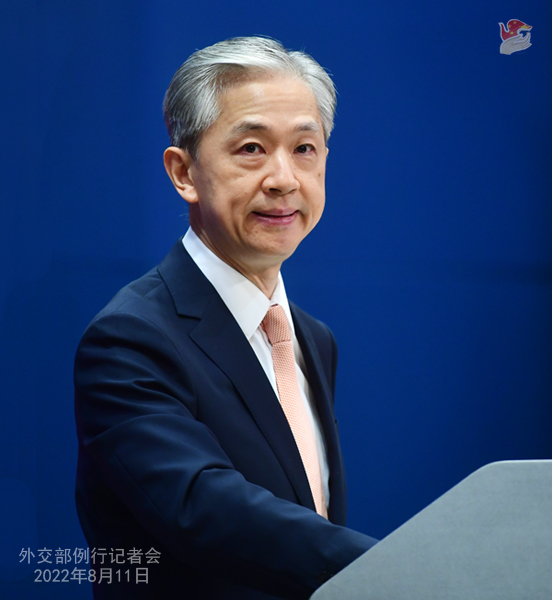
China News Service: The China Society for Human Rights Studies recently released a report titled “US commits serious crimes of violating human rights in the Middle East and beyond”. Do you have anything to say about this?
Wang Wenbin: This report gives a systematic review of the three serious crimes the US has committed in the Middle East and surrounding areas: first, the US has launched wars that damaged people’s right to life and survival. It just cannot deflect responsibility for starting wars and conflicts in Afghanistan, Iraq, Libya, Syria and elsewhere in the Middle East and its neighborhood; second, the US has forced transformation and slapped unilateral sanctions that severely infringe on people’s rights to development and health. It has incited “color revolutions” in many countries, subverted their governments and abused economic sanctions, which has crippled their economies and made people’s life even more difficult; third, the US has created “clash of civilizations” that violate the freedom of religious belief. It has generated and spread the narrative of “clash of civilizations” and “Islamophobia”, tortured Muslim prisoners and smeared and stigmatized the Islamic civilization in the Middle East.
The US’s serious human rights violations in the Middle East have caused permanent damage and irreparable losses to countries and people in the region. Political analysts in countries in the Middle East have pointed out that for the US, war is an instrument of domination. The US’s proxy wars in the region have served as a breeding ground for terrorist organizations. The US has been sabotaging stability and insulting and bullying countries in the region under the pretext of democracy and human rights. According to a survey by the Arab Center for Research and Policy Studies, 81% of the respondents in Arab countries believe that the US's Middle East policy poses a threat to the security and stability of the region. Jack Midgley, who served in Afghanistan as a US military advisor, said that the US has been undermining democracy by imposing the US-style democracy in its wars overseas over the past decades in disregard of the will of local people. On the 20th anniversary of the Afghan war, The New York Times commented that the war waged by the US has left the terrorist organizations there much stronger than 20 years ago.
With the blood of the people in the Middle East on their hands, the US politicians and their war machine are in no position to act as a “human rights defender” or “human rights judge”. We call on more people in the Middle East to stand up and say no to the hegemony and bullying of the US. We also call on the UN Human Rights Council and OHCHR to increase their attention to the human rights violations committed by the US in the Middle East and other regions and to take necessary action in response.
Bloomberg: About the comments made recently by the US commerce chief Gina Raimondo. In an interview with Bloomberg TV, Ms. Raimondo said that President Biden is very cautious about actions he will take on the Trump-era tariffs on Chinese imports. She added that he was weighing his options and mentioned that this was happening in an environment that has been complicated in the wake of the visit by Nancy Pelosi to Taiwan. Does the foreign ministry have any comment?
Wang Wenbin: As we have repeatedly pointed out, there is no winner in a trade war. The US’s unilateral imposition of additional tariffs does not serve the interests of the US, China or the world. To remove all additional tariffs imposed on China as soon as possible is good for the US, China and the world.
The context and the events that led to the current tensions in the Taiwan Strait are crystal-clear. The US is the unprovoked provocateur and creator of the crisis. The US needs to be fully aware of the egregious nature of Pelosi’s visit to the Taiwan region, earnestly reflect on the serious consequences of the visit, and immediately rectify its mistake. The US should not expect China to trade away its core interests. The US should play no games but return to the one-China principle and the three Sino-US joint communiqués.
The Hindu: China has placed a hold on an application from India to list an individual related to Pakistan-based Jaish e Mohammad as a UN Security Council designated terrorist. This was a “technical hold” that was placed at the UNSC sanctions committee. Could you explain why China placed this hold?
Wang Wenbin: I believe you were referring to the designation issue at the 1267 Committee of the UN Security Council. The committee has clear guidelines regarding the designation of terrorist organizations and individuals and related procedures. China always takes part in the work of the committee in a constructive and responsible manner in strict accordance with these rules and procedures. We hope other members will do the same.
Prasar Bharati: Except for China, all other UNSC members agreed on putting sanctions. It was only China which put a hold on this. And in June also China put a hold on another sanctioning. Because China has put the technical hold twice in the last two months and will it not be seen as China abdicating from its responsibility as a permanent member of the UN Security Council? Have you now considered the issue on which you had already placed a hold in June?
Wang Wenbin: I just stated China’s position very clearly. China always takes part in the work of the 1267 Committee of the UN Security Council in a constructive and responsible manner in strict accordance with the committee’s rules and procedures. We need more time to assess the relevant application. We hope media outlets will not be led by rumors and make unwarranted speculations.
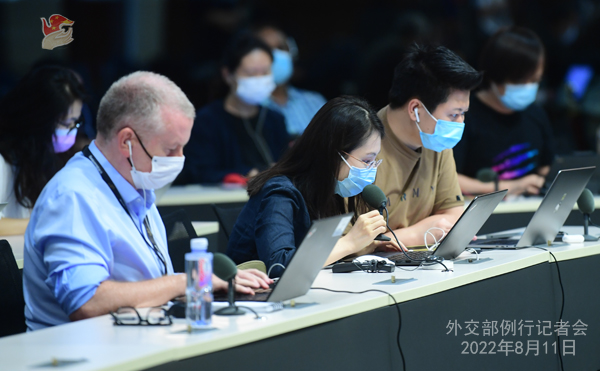
CCTV: British Foreign Secretary Liz Truss said on August 10 that, “The UK and partners have condemned in the strongest terms China’s escalation in the region around Taiwan, as seen through our recent G7 statement." Behaviour and rhetoric from Beijing threaten peace and stability in the region. The United Kingdom urges China to resolve any differences by peaceful means, without the threat or use of force or coercion.” Do you have any comment?
Wang Wenbin: The UK has mischaracterized the facts and made irresponsible remarks on China’s justified, necessary and lawful move to safeguard national sovereignty and territorial integrity. China deplores and is firmly against this, and has lodged solemn démarches with the UK side.
Everything happens for a reason. The US is the one who made the provocation first and started the crisis. The DPP authorities have been seeking “Taiwan independence” through soliciting US support. It is only legitimate, lawful and justified for China to uphold its territorial integrity and oppose secession. The UK turned a blind eye to the US’s provocation and violation while groundlessly criticizing the countermeasures China has taken for the sake of defending justice. This is typical double standard. It fully exposes the UK’s hypocrisy stemming from its imperialist past. If the UK truly cares about peace and stability in the Taiwan Strait, it should condemn the US and the “Taiwan independence” forces and stop them from being provocative and playing with fire. If Scotland were to collude with external forces and split itself from the UK, would the UK remain calm, show restraint, sit by and watch the situation deteriorate?
Every issue has its own merits. Justice must prevail and be upheld. If facts and truth mean nothing to the UK, in what way could it possibly think it deserves a “Global Britain”? The UK follows the US’s lead and does the US’s bidding along with a handful of other countries. The UK’s reputation as an independent country has long gone bankrupt, and its so-called “diplomatic ambition” is based on empty premises. More than 170 countries and many international organizations have openly voiced support for the justified measures China has taken to uphold its rights. Their voice has drowned out the noise of the joint statement by the UK and other G7 members.
The Taiwan question is purely China’s internal affair. The reunification of the two sides of the Taiwan Strait is a historical trend that will surely be realized in the course of the great rejuvenation of the Chinese nation. No force can stand in the way of the reunification of China. Any words and deeds endorsing the “Taiwan independence” forces are doomed to be swept into the dustbin of history.
Prasar Bharati: You said that China needs some time to assess the request for sanctioning. How much time will it take?
Wang Wenbin: We approach the matter in strict accordance with relevant rules and procedures.
The Hindu: About Foreign Minister Wang Yi’s meeting with Nepal’s Foreign Minister yesterday. I was just wondering if you had any information on talks that they had on the study for the cross-border railway between China and Nepal?
Wang Wenbin: I would like to take this opportunity to share with you the talks between Chinese and Nepali foreign ministers. Yesterday, State Councilor and Foreign Minister Wang Yi held talks with the visiting Nepali Foreign Minister Narayan Khadka in Qingdao, Shandong Province.
State Councilor and Foreign Minister Wang Yi said, China and Nepal, linked by mountains and rivers, have enjoyed ever-lasting friendship. No matter how the international and regional situations changed, China and Nepal have always firmly supported each other on issues involving core interests and always stood shoulder to shoulder in the face of tests and challenges. It's China's consistent position that all countries, big or small, rich or poor, strong or weak, are equal. China will continue to firmly support Nepal's efforts to safeguard its sovereignty, independence and territorial integrity, pursue a development path in line with its national conditions, improve Nepali people's lives, and revitalize the nation. China is ready to work with Nepal to implement the fruitful outcomes of President Xi Jinping’s historic visit to Nepal, advance high-quality Belt and Road cooperation, carry forward the ever-lasting friendship, and open up new prospects for the development of bilateral relations.
Foreign Minister Khadka said that Nepal and China enjoy a time-honored friendship and are true friends who share weal and woe. Nepal firmly pursues the one-China principle and will never allow any activities that use Nepal’s territory to oppose China and undermine China’s interests. Nepal supports China's legitimate position on Tibet, Xinjiang, Hong Kong and other internal affairs.
The two sides conducted in-depth communication on bilateral relations and practical cooperation, and reached extensive common understandings.
The two sides will maintain high-level exchanges, strengthen party-to-party exchanges, and deepen exchanges of experience and mutual learning on party and state governance.
The two sides will negotiate and conclude an implementation plan for Belt and Road cooperation as soon as possible, and will convene a meeting of the Joint Commission on Economy and Trade and a meeting of the Working Group on Facilitating Trade within this year. China welcomes Nepal's efforts to export more tea, medical herbs and farm and pasture products to China, and encourages Chinese enterprises to invest in Nepal, so as to help the country develop manufacturing and modern agriculture and enhance its capacity for self-driven development.
The two sides will speed up the Kathmandu Ring Road Improvement Project (Phase II) at a faster pace and advance electric power interconnection projects. The two sides will strengthen the Electric Power Cooperation Plan and build the Trans-Himalayan Multi-Dimensional Connectivity Network.
The two sides will continue to deepen cooperation on disaster prevention and mitigation. The Nepali side thanked China for lending a helping hand at the critical moment when Nepal was struck by earthquake and fell short of fuel. The Chinese side said that China will provide Nepal with disaster prevention and medical supplies through China-South Asia Emergency Supplies Reserve.
The two sides will strengthen cooperation on pandemic response and medical care, advance the development and operation of the China-Nepal Chinese Medicine Center, and support enterprises of the two countries in carrying out cooperation in planting Chinese medical herbs. China will provide blood cancer treatment equipment and technology for public hospitals in Nepal and continue to offer vaccine assistance.
The two sides will strengthen cooperation on justice, combating cross-border cybercrimes, border management, joint prevention and control, and ports, among others.
The two sides will deepen people-to-people and cultural exchanges and increase direct flights to facilitate personnel exchanges. China welcomes Nepali students to return to China to continue their studies.
State Councilor and Foreign Minister Wang Yi announced that Chinese financial aid for Nepal will be used to support the feasibility study of the China-Nepal cross-border railway, and China will send experts to Nepal to conduct on-the-ground survey within this year. Noting that the zero-tariff treatment granted by China to 98 percent of Nepali products will come into effect on September 1, Wang Yi said that China supports Nepal in making good use of this policy dividend to expand its export to China.
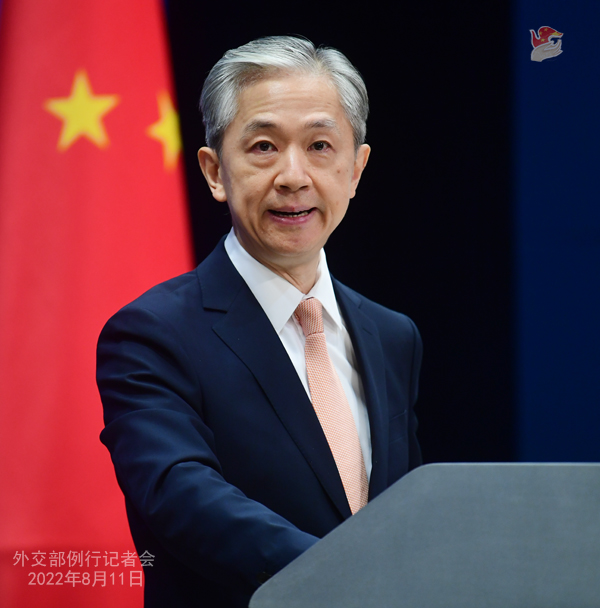
Prasar Bharati: You said that China and Nepal agreed for cross-Himalaya connectivity projects. Can you please share a little more details about the connectivity projects? And also, would these projects be coming under the Belt and Road Initiative of China? Two days ago, the Financial Times interviewed Bangladeshi finance minister Mustafa Kamal. In this interview, Mustafa Kamal warned developing countries from taking loans through the Belt and Road Initiative of China. He said developing countries must think twice before taking BRI loans, considering global inflation and slowing growth, which add to the (strains on) indebted emerging economies. Do you have any comments and response?
Wang Wenbin: I just shared the information on the talks between Chinese and Nepali foreign ministers. On the specific projects you mentioned, we will release information in due course.
As to your second question, I haven’t seen relevant reports. But I want to stress that for a long time, China has actively supported the economic development of fellow developing countries through high-quality Belt and Road cooperation. It has brought tangible benefits to the locals and been widely welcomed and highly appreciated by developing countries. The loans provided by China to developing countries like Bangladesh and Sri Lanka take up a far smaller share than those of the international capital market and multilateral financial institutions led by Western countries. And what we provide to these countries are mainly concessional loans with low interest rates and long terms of maturity, which not only would not add to their debt burden, but also play a positive role in improving their infrastructure and people’s livelihood. In fact,senior Bangladeshi officials like the Prime Minister and the Foreign Minister recently have thanked China for providing aid and loans to Bangladesh, and welcomed China’s mutually beneficial cooperation in the country. At the same time, China attaches great importance to addressing debt vulnerability of developing countries and has fully implemented the G20 Debt Service Suspension Initiative. China ranks the first among G20 members in terms of deferral amount.
In comparison, however, the US and some other Western countries, driven by high returns, have used lax financing terms to induce developing countries to issue a large number of high-rate bonds, creating debt hikes in these countries and then raking in profits by adopting deflationary policies and deploying market speculation. The US and some other Western countries also apply unilateral sanctions and tariff barriers that undermine the security of the global supply and industrial chains, and aggravate the price surge of bulk commodities like energy and food, further worsening the economic and financial situation of developing countries. But these Western countries, instead of reflecting on their behavior, have deflected blame, exploited those debt issues to hype up the so-called “China’s debt trap” and smeared the mutually beneficial cooperation between developing countries. Facts are facts. We believe that Bangladesh, Sri Lanka and other developing countries will see these things in a fair and objective way and make their fair judgement.
Reuters: So just on the railway there, does China hope to build a railway between China and Nepal? If so, what kind of railway and what sort of timeframe we are looking at?
Wang Wenbin: As I just shared with you, during the talks of the Chinese and Nepali foreign ministers, the two sides agreed to build the Trans-Himalayan Multi-Dimensional Connectivity Network. State Councilor and Foreign Minister Wang Yi announced that Chinese aid for Nepal will be used to support the feasibility study of the China-Nepal cross-border railway, and China will send experts to Nepal to conduct on-the-ground survey within this year.
Prasar Bharati: Can you please confirm if there were any talks between the Chinese foreign minister and Bangladeshi counterparts, regarding any new Chinese loans to Bangladesh or financial assistance in that matter?
Wang Wenbin: As to the visit by State Councilor and Foreign Minister Wang Yi to Bangladesh, China has put out a readout which you may refer to.

